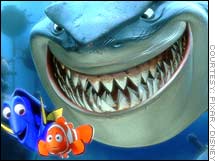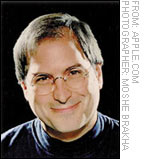NEW YORK (CNN/Money) -
Pixar Animation Studios Inc. said Thursday it ended talks with Walt Disney Co. to extend a five-picture deal for Disney to distribute Pixar films.
Pixar, the computer animation pioneer founded by Apple Computer Inc.'s Steve Jobs -- and the maker of the hit "Finding Nemo" -- said it would begin talks with other companies to distribute its films starting in 2006.
 |
|
| Pixar's "Finding Nemo" is the biggest grossing animated movie of all time. |
"After ten months of trying to strike a deal with Disney, we're moving on," Pixar CEO Steve Jobs said in a statement. "We've had a great run together -- one of the most successful in Hollywood history -- and it's a shame that Disney won't be participating in Pixar's future successes."
The move was a clear setback to Disney, which reaped a financial and critical bonanza from the partnership and has struggled with its own strategy for animation.
Disney said Pixar's final offer would have cost Disney hundreds of millions of dollars from the existing distribution deal and was not sweet enough going forward.
"Although we would have enjoyed continuing our successful collaboration under mutually acceptable terms, Pixar understandably has chosen to go its own way to grow as an independent company," Disney Chairman and CEO Michael Eisner said in a statement.

Pixar (PIXR: Research, Estimates) stock rose initially in after-hours trading but later fell back, while Disney (DIS: Research, Estimates) stock tumbled about 6 percent.
Other studios are already expressing interest in forging a relationship with Pixar. A Warner Bros. spokesperson told CNN, "We would love to be in business with Pixar. They are a great company." Warner Bros. has not yet engaged in formal talks with the animator.
Pixar said its five films so far -- including "Toy Story", "Monsters Inc." and "Finding Nemo" -- have taken in $2.5 billion at the worldwide box office and sold more than 150 million DVDs and videos. "Finding Nemo" was the highest grossing animated film of all time.
Pixar had complained that the terms of the distribution deal were tilted too heavily in Disney's favor. Under the deal, Pixar was responsible for content, while Disney handled distribution and marketing.
 |
|
| Pixar CEO Steve Jobs, whose studio has been a runaway success. |
In exchange, Pixar has split profits with Disney and pays the studio a distribution fee of between 10 percent to 15 percent of revenue. Based on its blockbuster success, Pixar has argued that it should keep the profit itself and cut the fees its studio partner charges.
Many observers had expected Pixar and Disney to keep talking at least until the middle of this year and to eventually reach a deal since both had gained so much from their partnership.
"It makes it look like Eisner did something wrong again, but we shouldn't jump to conclusions. This could be a negotiating tactic by Pixar as well," Patrick McKeigue, an analyst at Independence Investment, which holds Disney shares, told Reuters.
Roy Disney and ally Stanley Gold, who both resigned from the Disney board late last year and called for Eisner to step down, placed the blame squarely on the Disney CEO.
"More than a year ago, we warned the Disney board that we believed Michael Eisner was mismanaging the Pixar partnership and expressed our concern that the relationship was in jeopardy," they said in a statement issued late Thursday.
Click here to check media and entertainment stocks
Disney noted in its statement that it owns rights to all the Pixar movies, as well as two more animated features yet to be delivered -- "The Incredibles" due this year and "Cars", expected in 2005.
Disney will distribute those two films with Pixar getting its share of the profits. In addition, Disney probably will be able to make the sequels to all the Pixar films made under the current agreement, paying Pixar only limited royalties.
 |
YOUR E-MAIL ALERTS
|
Follow the news that matters to you. Create your own alert to be notified on topics you're interested in.
Or, visit Popular Alerts for suggestions.
|
|
|
While Pixar has the right of first refusal to make the sequels, under the current agreement it would have to put up half the money and get only 35 percent of the profit, which makes it extremely unlikely Pixar will make the sequels, said Jeffrey Logsdon, analyst with Harris, Nesbitt and Gerard.
Disney said Thursday it's working on "Toy Story 3" as part of a new push to do its own computer-generated animated features, though it did not give a release date.

-- from staff and wire reports
|

